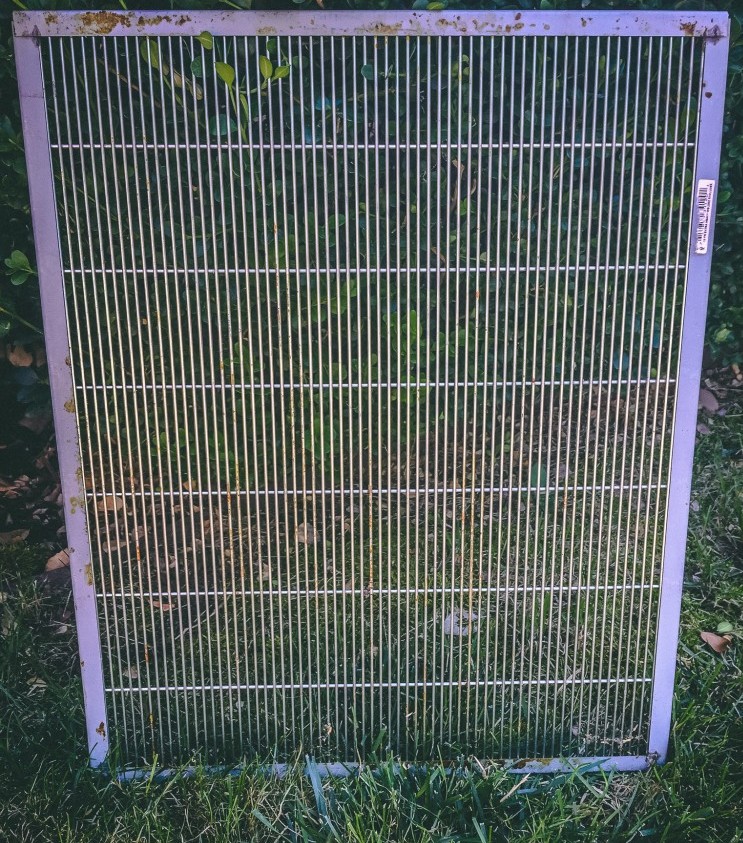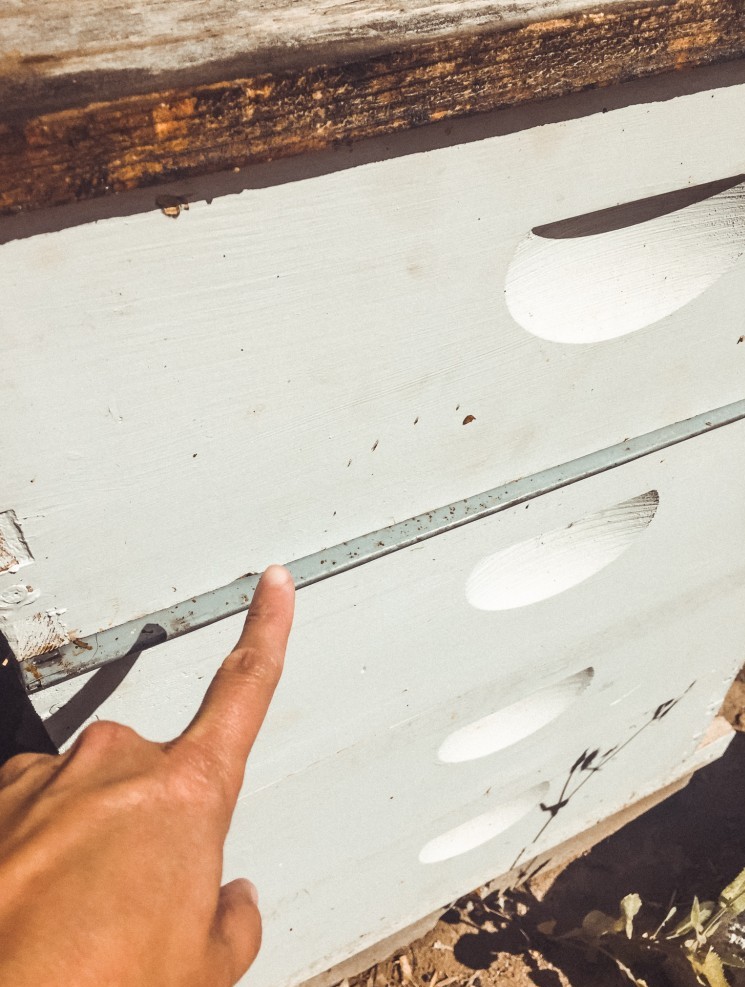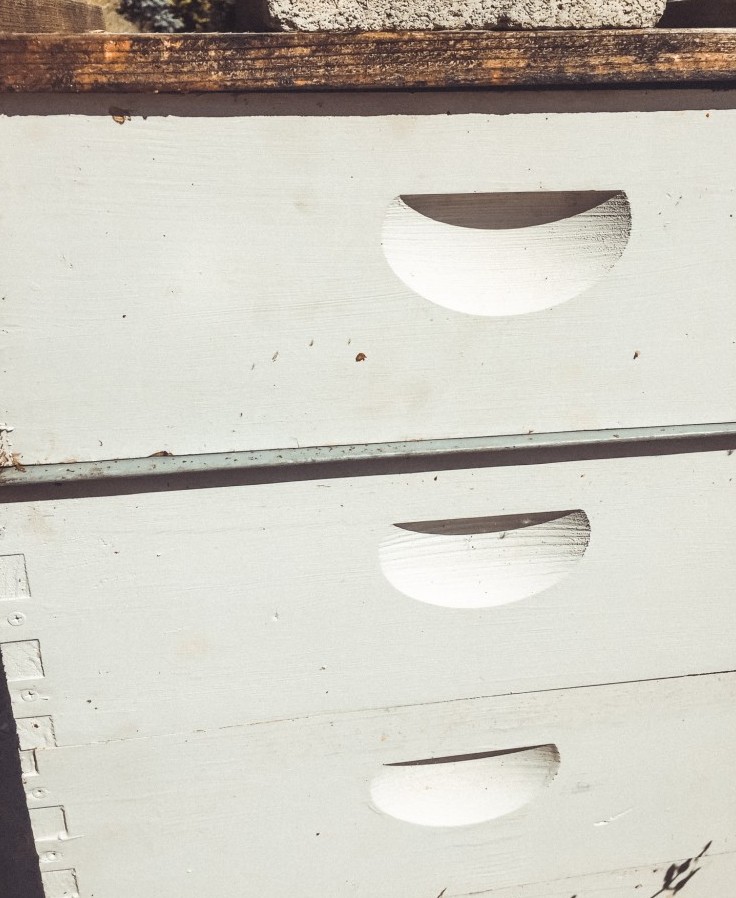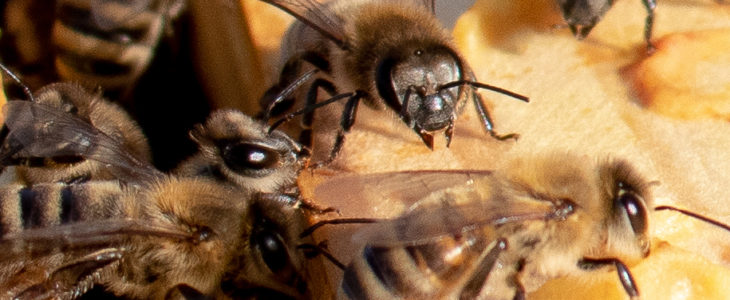In beekeeping there has to be some way to stop the queen bee from laying eggs in your honey! Otherwise, it’s quite disgusting. Can you imagine little egg parts in your delicious, sweet honey?
What is a queen excluder?
So, needless to say the purpose of a queen excluder is to prevent the queen bee from laying eggs in your honey. But how do you do this?
Well, the queen excluder is more of a gate that only allows the worker bees entrance (so they can produce honey) and stops the queen from passing.

There are a couple of different types of queen excluders in regard to what they are made of.
The one I prefer is a metal queen excluder. It looks like a metal gate that fits perfectly over the top of one of the hive boxes.
Usually you will want to keep the honey in the top boxes leaving the bottom boxes for the rest of the hive.
This also makes extracting the boxes for honey production easier.
There are different sizes of queen excluders too. If you have 10 frame hive boxes (hive boxes that have 10 frames placed inside of them) or 8 frame boxes (hive boxes that have 8 frames placed inside of them), then you will want to make sure that your queen excluder is the same size as the box you have.
When to use a queen excluder
A queen excluder should be used after the honey bees have already made enough food for themselves. Depending on the size of the hive boxes you have purchase will determine how long you have to wait until those boxes are full.
For example, I have smaller sized boxes (8frames that are all mediums) and will wait until 3 of my hive boxes are full.
The time frame of when to put on the queen excluder may vary from hive to hive. Usually depending on how quickly your hive fills up the hive, it could be as early as late spring to early summer.
This is because the honey flow season (or the time frame in which you collect honey for your bees) is in the late summer only.
Why would you only harvest honey once a year?
The queen will start laying her eggs in the early spring, the workers will start doing their thing (which is everything!!) so by the time that they have collected enough honey and food for the year, it’s roughly late spring early summer.
Also, keep in mind that sometimes you won’t get a chance to collect any honey for yourself. If your beehive is a bit smaller or they aren’t doing so well, you won’t want to harvest honey for yourself.
Can drones get pass the queen excluder?
Once the queen excluder is put on, the only type of bees that are able to get through this gate are the worker bees. They are small enough and can easily fit through.
The queen and the drones (male honeybees) are not able to fit their bodies through. However, sometimes I’ll open up my hive and will see a drone stuck in the queen excluder.
Or, unfortunately, I’ll find a dead drone who didn’t make it. This is rare and there isn’t much you can do about it.
How to install a queen excluder

Installing a queen excluder is super easy. You’ll start by taking off the lid of the hive, placing the queen excluder over the top of the first hive box that’s there.
You’ll then place the next hive box over the top of the queen excluder, then put the lid of the hive box on the top of that.
From this point moving forward, whenever you are doing a hive inspection you will want to be careful to make sure the queen does not get into the top part of your hive.
So in other words, when you take off the top boxes for inspection, make sure to set that box aside from the others as well as ensuring the queen excluder is put back on the hive box so there aren’t any gaps along the side for the queen to get into the top boxes.
Beekeeping Lingo Regarding Hive Boxes.
The lingo for the top boxes that you place on top of the queen excluder is called a “Super.” You may hear this from time to time if you are a part of a beekeeping club or have encountered other beekeepers.
However, it doesn’t mean you have to go out and purchase specific boxes for the bees to keep honey in. Honestly, the bees aren’t going to know the difference.
There are “mediums” and “deeps” for hive sizes which will come in handy when you go to purchase hive boxes. The “deeps” are deeper of course. However, they are very heavy, whereas, the “mediums” are more shallow but easier to carry. It really boils down to preference.
It is a lot easier (in my opinion) to keep all of your boxes the same size. It makes your life so much easier!
Final Thoughts
Queen excluders are necessary if you are deciding to be a beekeeper. This will keep your honey free of any eggs or baby honeybee parts.

Granted, you will still have some impurities when you go to strain your honey, however, it is minimal compared to if you chose to not use it.
These excluders are relatively inexpensive, easy to install and maintain.
And even though there are probably several kinds, you can bet that almost any type that you get will probably work.
If you’re like me, you’ll become so obsessed with honeybees that you’ll include things like a queen excluder on your Christmas list!
Every beekeeper has his/her own way of doing things or tools that they prefer to use. No certain way is wrong or right. Some ways or tools may be easier or easier to use for that beekeeper.
I highly advise that if you chose to become a beekeeper to try out different ways to see which way is easiest for you!
Please feel free to leave any comments or questions that you may have as well! I’m more than happy to talk about honeybees to anyone!

19 comments on “What is a queen excluder? – And when should you use it?”
walker2
August 28, 2019 at 10:22 pmWhat a great article about beekeeping! I am so happy to see there are people who are saving the bees. I know they have had some problems in the last few years. In fact, I had a nice fat bee outside my front door just this morning! I also know how very good “homegrown” honey is, I personally go to a Farmers Market in the area where I live to obtain honey from a local beekeeper. It is delicious! You should put some honey recipes on your site just for fun! How long have you been working with bees? I haven’t met a beekeeper yet that wasn’t passionate about what they do and I am grateful to all of you. Keep up the good work and again, great article!
Randi
August 28, 2019 at 10:25 pmHello! Thank you, I’m glad you liked the article! You’re so right, beekeepers are pretty passionate about their bees! And I am pretty obsessed! Putting some honey recipes on my site is an excellent idea. I will have to do that. I’m also thrilled that you understand the importance of these little creatures. Thank you so much for your response!!
Anusuya
August 28, 2019 at 10:38 pmHi there,
I see your passion clearly through your writing. It is a highly informative post about queen bee exclusion from the honey collection area which will help to get purer money free of eggs. The explanation of how and what to install the excluder is clearly written and demonstrated, any layman can easily follow.
I have always though honey cultivation and saving this insect will be toward saving the earth and is a noble cause.
Thank you for effort towards this cause. Your site will help many people.
Randi
August 28, 2019 at 10:43 pmThank you so much! I’m glad you find honeybees just as important and valuable as I do. I’m also thrilled that you found the post easy to read! I appreciate your response!!
Willy
September 2, 2019 at 8:08 pmWow! This is a really comprehensive and educative posy here. I am glad that I would be leaving here fully packaged with enough knowledge on what queen excluders are and there uses. I have always wanted to know more on how to rear bees. This post has not just let me know these kinds of excluders are fixed, but has explained how they work and are used. Anyone who lacks enough knowledge on queen bees excluding needs to read this review as a guide and handbook. Thanks for this value adding post.
Randi
September 2, 2019 at 8:29 pmHello WIlly! Thank you! I hope that this post can inspire others to want to know even more about honeybees and the value they hold! I appreciate your response!! 🙂
Henry
September 2, 2019 at 8:09 pmHi Randi! I agree with you: Queen excluders are relatively inexpensive and they make a huge difference preserving our honey from impurities. It’s a pity you find a dead drone every once in a while. But I still believe having queen excluders is a no brainer. I haven’t bought mine up to this point but your post has encouraged me to. Thanks!
Randi
September 2, 2019 at 8:31 pmHello Henry, it is a bit sad to see a drone who got caught up in the excluder. Good news is that it is rare! Thank you for taking the time to read my post and for your response!
Henderson
September 2, 2019 at 8:14 pmThis is a very nicely written post. I like how you put in so much passion into taking care of this bees. It’s very nice. I do not know so much about taking care of bees but I have a friend who is into this and I’m sure he will really enjoy reading this post and learn a lot about the queen excluder. Great one!
Randi
September 2, 2019 at 8:32 pmHello Henderson! I appreciate your response! I honestly enjoy hearing about other beekeepers and their passion for these little creatures! I hope that he keeps it up!
Claudio
September 2, 2019 at 8:28 pmHello,
Reading your very interesting article reminds me of a beekeeper friend who has several honeycombs installed very close to my blueberry plantation.
I didn’t know that beekeepers have to have an exclusionary queen to keep them from laying their eggs in honey. Of course I will ask my friend the question.
I think so because it gives me a few jars of honey every year and I see it without any impurities.
I have become accustomed to consuming honey in all my breakfasts that makes us rich and good as a natural food. Congratulations for being a producer of food as healthy as honey.
Greetings from Argentina! Claudio
Randi
September 6, 2019 at 12:22 amHello Claudio! First of all I am blown away when you said blueberry plantation! That sounds so interesting as well. It is nice to have honey that doesn’t have little eggs in it for sure. It makes it a lot more sanitary too. However, nothing compares to natural honey straight from the hive. Thank you for your response!
gr8megawinner
September 9, 2019 at 12:13 amI have read this before somewhere. I am fascinated by the intricacies of the production of bees. The honey that we eat was taken meticulously by a beekeeper and highlighting the bee excluder, its importance, and its role. Imagine not having it so as the queen can contaminate the honey with any body parts of eggs! so with this bee excluder, there is no such thing like this if there is it’s minimal. I understood that the excluder can only accommodate worker bee in getting inside the hive box. It is a wonderful job that is why I have an added admiration to my friend’s friend who had bee boxes selling indeed once a year the best honey in the country.
Randi
September 9, 2019 at 11:16 amHello! You and I are both fascinated by the intricacies of honeybees. I hope that you continue with that fascination to learn more about them! Thank you for replying!
Riaz Shah
September 9, 2019 at 12:14 amI never knew about this Randi!
We have our own hives too, my mum loves her stingless bees and I often help her out with taking care of the bees and harvesting their honey, I never thought that queens lay eggs in their honey! Forgive me for asking as I’m a complete newbie to this but is it normal for every type of bee that their queens lay eggs in the honey?
Randi
September 9, 2019 at 11:11 amHello Riaz! I have heard of stingless bees but I never met someone who has them! That’s fascinating! To answer your question, on the same frame that the queen lays her eggs, you take the risk of there being a mixture of cells that have eggs and cells that have honey. Thank you for your response!!
Brian Perisho - Fireman Marketing
September 9, 2019 at 12:16 amWow, what interesting information. I have a State Trooper buddy that I went to college with that is an active beekeeper. I have been fortunate enough to be able to participate in hive maintenance with him.
Honestly, I was very intimidated and worried about being stung by the bees the first time I worked in the hives. It was really an awesome opportunity. The only time they got really restless was around dark. We just added a little more smoke and backed away.
Randi
September 9, 2019 at 11:10 amHello Brian! It is pretty intimidating diving into a hive the first time. To be honest I was pretty intimidated my very first time as well! But I’m glad you got an opportunity to be able to check it out! Thank you for your response!
Julia Cole-Spracklen
February 25, 2021 at 3:08 amI wondered what the edge of the metal thing was on your hives! Of course, I never thought about it when you were here.